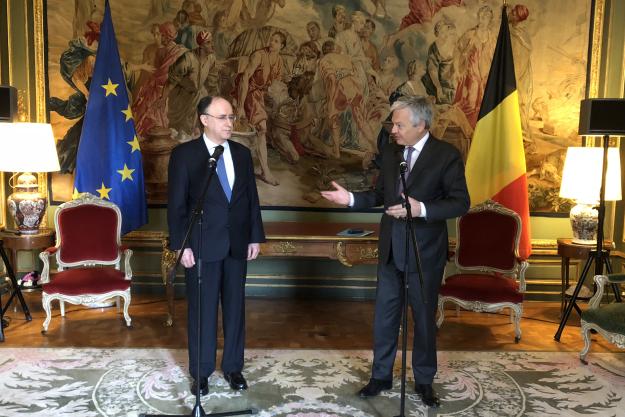
H.E. Mr Fernando Arias, Director-General of the Organisation for the Prohibition of Chemical Weapons (OPCW) (left) with H.E. Mr Didier Reynders, Deputy Prime Minister, Minister of Foreign Affairs and European Affairs, and Minister of Defence of Belgium (right)
THE HAGUE, Netherlands —19 December 2018 — The Director-General of the Organisation for the Prohibition of Chemical Weapons (OPCW), H.E. Mr Fernando Arias, met with the Deputy Prime Minister, Minister of Foreign Affairs and European Affairs, and Minister of Defence of Belgium, H.E. Mr Didier Reynders, and delivered a keynote address at the Seventh European Union (EU) Non-Proliferation and Disarmament Conference during a visit to Brussels yesterday.
The Director-General and Minister Reynders discussed the recent Fourth Review Conference, the Organisation’s work pertaining to Syria, and the need for all OPCW Member States to continue their steadfast support of the norm against chemical weapons.
The Director-General highlighted the construction of a new OPCW Centre for Chemistry and Technology that will upgrade the OPCW analytical and verification capabilities as a key priority for the Organisation. The Director-General expressed his thanks to Minister Reynders for Belgium’s €2 million contribution to the project.
Following the meeting with Minister Reynders, the Director-General delivered a keynote address to the EU Non-Proliferation and Disarmament Consortium, which includes senior European officials, disarmament experts and civil society representatives who engage on issues pertaining to WMDs and conventional weapons. The Director-General conveyed his assessment of the recent Fourth Review Conference where the Organisation’s Member States evaluated and debated the implementation of the Chemical Weapons Convention.

Director-General of the Organisation for the Prohibition of Chemical Weapons (OPCW), H.E. Mr Fernando Arias delivered a keynote address to the EU Non-Proliferation and Disarmament Consortium
According to the Director-General, the Review Conference allowed “for a thorough and comprehensive evaluation of the Convention”. He also shared that “common ground was also found on numerous important issues such as strengthening the verification regime, enhancing capacity-development, and widening the engagement of the OPCW“.
The Director-General further expressed that “addressing the re-emergence of chemical weapons is now one of the defining tests of the OPCW” and that the issue will remain central long into the future. “Identifying those responsible for chemical attacks is an important factor to deterring further use,” he underscored. Following a decision of the Special Session of the Conference of the States Parties in June, the OPCW Technical Secretariat has been working to set up a team and the expertise needed to fulfil this mission.
The Director-General responded to queries during a short question and answer session.
Background
The EU Non-Proliferation and Disarmament Consortium was formed by a 2010 decision of the Council of the European Union to encourage dialogue on matters related to WMDs and their proliferation. Entering its seventh year, the Consortium’s annual Conference serves as a platform allowing a variety of influential stakeholders to analyse and collaborate on disarmament issues.
As the implementing body for the Chemical Weapons Convention, the OPCW, with its 193 Member States, oversees the global endeavour to permanently eliminate chemical weapons. Since the Convention’s entry into force in 1997, it is the most successful disarmament treaty eliminating an entire class of weapons of mass destruction.
Over 96% of all chemical weapon stockpiles declared by possessor States have been destroyed under OPCW verification. For its extensive efforts in eliminating chemical weapons, the OPCW received the 2013 Nobel Peace Prize.
More Information
Belgium Contributes €2M to Future OPCW Centre for Chemistry and Technology
